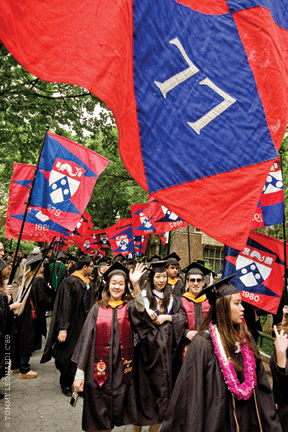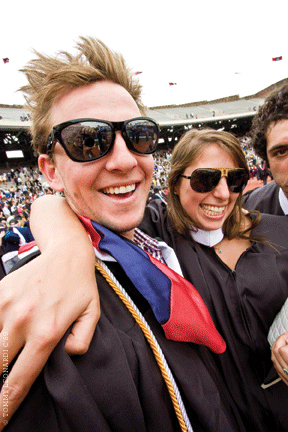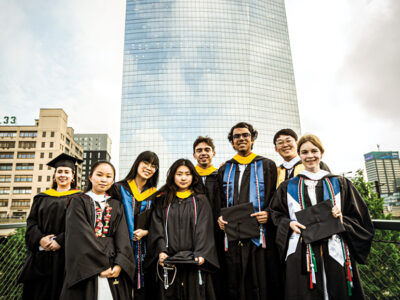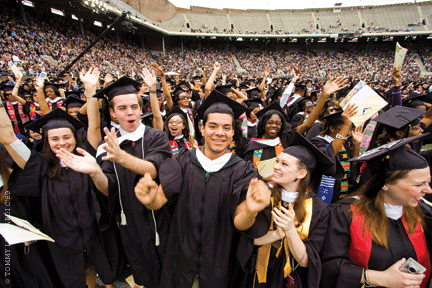
“You didn’t get Lady Gaga,” said Jon M. Huntsman Jr. C’87, beaming out over the graduates assembled on Franklin Field for the University’s 254th Commencement exercises on May 17. “You didn’t get Oprah,” the career politician and diplomat continued. “Snoop Dog came to [Spring] Fling.”
The Class of 2010 wouldn’t be receiving its valedictory dose of encouragement and congratulation from “the guy after whom the great building on campus is named” either. (That would be his father, for whom Wharton’s Huntsman Hall is named.)
Yet perhaps those absences were just as well, for it’s hard to imagine any of those potential speakers handing down advice gleaned from a Chinese prison cell.
“I wasn’t quite sure how best to spend my few moments of wisdom-dispensing,” said the current US Ambassador to China, “until a recent visit to see an American citizen detained in a Chinese prison. While there I was reminded that some folks, when all of their freedom is deprived, are able to put life in proper perspective. Perhaps being held for two and a half years without a trial or proper explanation will do it …
“Sitting in the sobering and sterile surrounding that has become this man’s existence, guarded by the ever watchful eye of public security officers, I brought him photos and letters from his family,” Huntsman recounted. “And as he read the cards, he was clearly moved and visibly shaken. As he wiped the tears from his eyes, he said he hoped his children would learn three simple lessons, so that their lives would have meaning. First, they should always have goals. Second: create an intellectual framework or personal philosophy to value the world and the people around them; this in turn will lead to wisdom. And third, they must remember that experience is the most valuable of all training grounds. Everyone will make mistakes. They are the dues owed to life. But learning from them, in order not to make them again, is the key to a happy and successful journey.”
Preceding Huntsman at the podium, Penn President Amy Gutmann exhorted Penn’s newest alumni to “embrace not perfection, but the ecstatic greatness of human life by being creative, courageous, and far ranging in your pursuits.” She observed: “Remember that you can achieve perfection at many small things without being especially good at anything truly important.”
Huntsman expanded on that theme, counseling a crowd that had spent their academic lives pursuing A’s to orient the next phase of their lives around five F’s: Find yourself; find a cause; face failure; find someone to love; and find meaning.
“While technology will drive us to mind-bending destinations during your lifetimes,” he noted, “the world is still managed, at all levels, by human beings and human emotion: happiness, sadness, mercy, thankfulness, and forgiveness … [and] the most precious of all attributes, good judgment.”
The United States government was pretty well represented at Commencement. Not only did Huntsman deliver the main address at Franklin Field, but Vice President Joe Biden spoke to the graduating seniors and families of the School of Social Policy and Practice (SP2), and US Senator Ted Kaufman WG’66 delivered the keynote speech to the School of Engineering and Applied Science. (For more on what Kaufman’s been up to lately, see p. 65.)
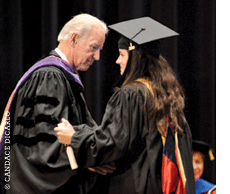
When Biden addressed the “fellow members of the Proud Parent Club” attending the SP2 ceremonies in Irvine Auditorium—his daughter Ashley joined him briefly on stage to receive her master’s of social work degree—he spoke with passion about the challenges facing the newly minted graduates, and predicted with characteristic optimism that they would be up to the task.
“What drew you to Penn is totally consistent with the mission statement of this prestigious graduate school: that is the pursuit of social justice,” he said. “I doubt there’s a group of women and men who take that more seriously than those of you who worked so hard to get to this point.
“For social justice to reign, there must be a mechanism to restrain the abuse of power,” he added. “Equally there must be opportunities for the most disadvantaged among us to be empowered with the tools and confidence to be able to meet their potential, to have a fighting chance to live an independent and meaningful life.”
Having gotten to know some of the graduating students already, he added, “the thing I love about all of you,” regardless of the particular degree being earned, “is that you believe in possibilities. The possibility that you can make things better. That’s the fuel that has ignited all progressive social change in this country’s history.
“My guess is that most if not all of you will never lose that optimism,” he said. “Because many of you know, through your field placements, how it feels to stand up for others. You know how it feels to empower someone. You’ve seen inmates in the prison system, and helped them prepare for days when they have paid society’s debt. You’ve worked to make the homeless more self-reliant. You’ve provided needed services for veterans returning home from combat, broken.”
While every class faces unique challenges, and each one “enters history that up till that point was written for them,” he went on, “few enter at the point where they genuinely have the choice to write history. Things are going to change radically in the next 20 years, whether or not you engage.”
Biden pointed to 1932, when Americans chose Franklin Delano Roosevelt and Germany chose Hitler, as one of those “inflection points” when the line of history is “momentarily straight before curving off in one direction or another.” Another was the 1960s, when his own generation “chose racial equality and gender equality, and others continued to cling to segregation and sexism,” he said. “Now your generation finds itself entering a world that feels like it’s been ripped from its moorings.
“This is your inflection point,” he said. “You’re going to choose inclusion and empowerment and openness, while others fight to maintain isolation and fear and xenophobia.
“I have no doubt who will prevail,” he added. “I believe we will advance, not regress.”
Looking back at his own life of political service, “how can I be anything other than optimistic?” he asked pointedly. “In a very short time I’ve seen the nation change dramatically for the better.”
He recalled how, as a young public defender in 1968, he would go down to the train station in Wilmington, Del., “where the National Guard was stationed with drawn bayonets on every corner because my city was in flames.” Fast-forward to January 17, 2009, when Biden stood on that same platform waiting to travel to Washington and be sworn in as vice president.
“I waited to be picked up by a black man,” he said, “who 40 years ago would not have been able to stand at that platform in that environment.” In a voice charged with emotion, he added: “So ladies and gentlemen: don’t tell me there’s not change.”
“I’m optimistic, because the history of this country warrants being optimistic,” he added. “I’m optimistic because I know you. Because the thread that runs between my generation and yours is an understanding of this truth: we have the power to change as long as we’re able to empower other people. ”
Biden concluded by quoting his mother, who passed away last year.
“If she were standing here today she’d look at you all and say, ‘You’re about to do God’s work,’” he said. “So go do it, and do it well. Keep your optimism, continue to believe in the possibilities. Because there is nothing that is beyond our capacity to change. Nothing.”
—T.P. and S.H.
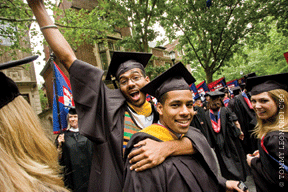
Honorary Degrees
Sandra M. Faber While completing pioneering studies of the formation and evolution of galaxies and of the structure of the universe, you advanced your field by championing the construction of powerful new instruments … In 1990, you assisted with the commissioning of the Wide Field Planetary Camera for the Hubble Space Telescope … As project leader for the Cosmology Survey Multi-Cycle Treasury Program, you oversee an international team that will collect images of more than 250,000 distant galaxies, providing the first comprehensive view of their structure and assembly over the first third of cosmic time.
Paul Farmer You founded Partners In Health with your colleagues in Haiti to leverage all available medical, social, and political resources to provide health care to the poor … Today, Partners In Health has replicated its community-based model in communities in Guatemala, Lesotho, Malawi, Mexico, Peru, Rwanda, Russia, and the United States.
Jon M. Huntsman, Jr. C’87 You launched your public service career in our nation’s capital, serving as White House staff assistant to President Ronald Reagan. Since that time, you have been appointed as Deputy Assistant Secretary of Commerce for Asia, U.S. Ambassador to Singapore, and Deputy U.S. Trade Representative … Prior to your appointment as United States Ambassador to China, you ably served as Governor of the State of Utah.
Abdullah Ibrahim Reflecting on the diverse musical styles that are combined so beautifully in your compositions, Francis Davis, jazz critic for The Village Voice, wrote, “what’s surprising about Ibrahim’s music, given its origin in a troubled place, is its defiant joy.” For more than six decades, you have shared your inspiring talent with humanity, spreading joy and earning recognition as one of the world’s most influential jazz pianists.
Risa J. Lavizzo-Mourey WG’86 Under your leadership, the Robert Wood Johnson Foundation has supported the development of solutions to some of the greatest problems facing our society. Today, projects funded by the foundation are supporting leadership development among health professionals, exploring the needs of vulnerable populations, and advancing health care availability, quality, and delivery.
Greg Mortenson Following a failed attempt to climb K2, the world’s second tallest mountain, you sought refuge in the small village of Korphe, Pakistan. During your convalescence, you observed children writing in the dirt with sticks, and you promised to return and help them build a proper school. You stood by your promise. Since your fateful climb, you have established or significantly supported more than 130 schools in Pakistan and Afghanistan, engaging with local community leaders to develop plans and build on-the-ground capacity.
Peter C. Nowell M’52 Res’56 While studying the tumor cells of individuals with chronic myelogenous leukemia in 1960, you identified the “Philadelphia chromosome,” a discovery that provided clear evidence of the link between cancer and chromosomal abnormalities. This seminal contribution and your subsequent predictions about the clonal evolution of tumors demonstrated the genetic basis of cancer, laying the foundation for the fields of cancer biology and cancer genetics. In addition, you investigated the effects of radiation and demonstrated that bone marrow could be transplanted.
James S. Riepe W’65 G’67 You joined Penn’s Board of Trustees in 1990, serving as chair of the Trustee Standing Committee on Audit and Compliance and of the Investment Board. Nine years later, you were selected to serve as Chair, and, over the course of the next decade, you worked closely with President Judith Rodin and President Amy Gutmann to transform Penn into the thriving, diverse, and highly rated university it is today. The University’s endowment increased by more than 50 percent; the Making History Campaign met 72 percent of its $3.5 billion goal, and Penn attracted historic numbers of highly talented students and bolstered the faculty with internationally renowned scholars.

